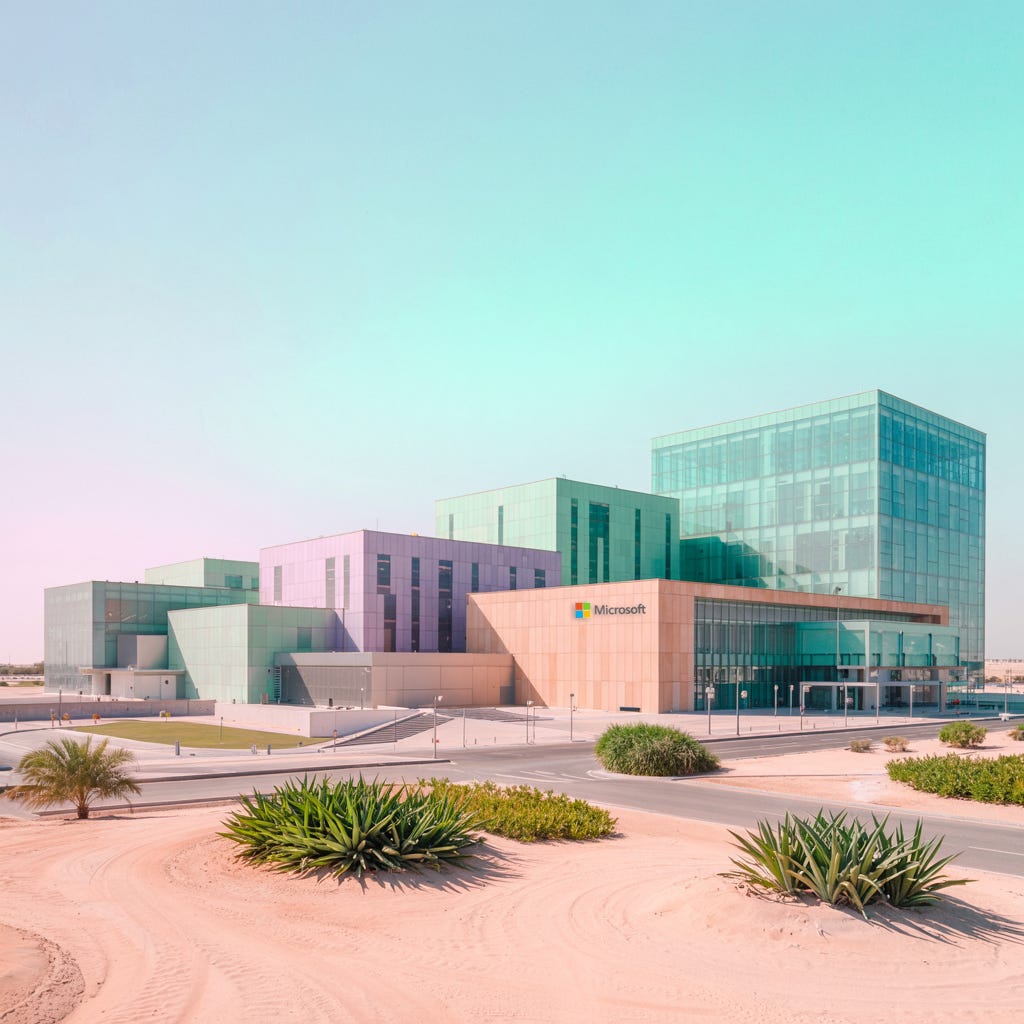Will Microsoft’s $15.2B UAE build make Azure the region’s sovereign cloud?
Microsoft’s $15.2B UAE investment is turning compliance, trust, and regulation into the next frontier of cloud dominance.
Welcome to Global Data Center Hub. Join investors, operators, and innovators reading to stay ahead of the latest trends in the data center sector in developed and emerging markets globally.
Microsoft’s $15.2 billion UAE investment (2023–2029) is one of the Middle East’s largest tech infrastructure moves, signaling a shift toward compliance, strategic partnerships, and embedded capital.
The initiative makes the UAE a test case for U.S.-approved AI infrastructure, linking governance with regional ambitions to become a digital hub and creating a model for sovereign-grade AI in emerging markets.
The Signal: Compliance Becomes Capital
When Microsoft secured approval from the U.S. government to export Nvidia’s high-end GPUs to Abu Dhabi, it marked the creation of a new template for technology diplomacy. Access to restricted compute is no longer just about market demand it now depends on governance credibility.
The investment’s foundation, the Intergovernmental Assurance Agreement (IGAA), translates trust into an investable asset. Cybersecurity, export controls, and data-protection standards are bound into an enforceable framework, effectively turning compliance into capital.
Geography of Growth: The Gulf’s Sovereign Corridor
Microsoft’s UAE build centers on Khazna Data Centers, a G42 subsidiary now operating twelve sites, with thirteen more under construction and three in advanced planning across Abu Dhabi, Dubai, and Al Ain.
The upcoming 200-megawatt expansion will anchor Azure’s sovereign cloud architecture, enabling in-country data processing for government, defense, and regulated industries. This architecture formalizes a “trusted-ally” corridor for AI infrastructure in the Middle East: sensitive compute remains under U.S. oversight while the UAE gains access to cutting-edge AI hardware and software ecosystems.
Demand Engine: Sovereign and Enterprise AI
Azure’s demand in the UAE comes from both sovereign and commercial clients. Government agencies, energy optimization programs, and defense workloads are all migrating to locally hosted environments under strict residency and cybersecurity rules.
At the same time, enterprise adoption of Microsoft 365 Copilot, GitHub Copilot, and other AI services continues to grow. Together, these sources ensure that new capacity is largely pre-contracted, limiting the risk of idle infrastructure.
Strategic Discipline: Build, Certify, Expand
Despite the scale of the investment, Microsoft’s approach in the UAE has been disciplined rather than purely expansionary. Every facility built under the IGAA must pass audit certification before commissioning, creating a compliance gate that synchronizes regulatory approval with capital deployment.
This model, which pairs staged CapEx release with governance verification, reduces risk and strengthens investor confidence. It also demonstrates a new form of “governance-linked capital recycling”: build, certify, and expand, repeating the cycle as regulatory capacity and demand increase in parallel..
Competitive Posture: Hyperscale Plus Sovereignty
Microsoft’s differentiation in the Gulf comes from integration. While competitors focus on regional expansion or research partnerships, Azure is embedded within the regulatory and political framework of the UAE.
This gives Azure a structural advantage in handling sensitive workloads requiring both performance and compliance. The UAE build is the first proof-of-concept for how hyperscalers can operate in export-controlled environments while meeting both commercial and public-sector demand.
The Takeaway
Can Microsoft’s $15.2 billion UAE program make Azure the region’s sovereign cloud? The evidence points strongly in that direction. By tying data-center capacity to formal governance frameworks, Microsoft has created an infrastructure model built on both trust and power.
This isn’t just commercial expansion it’s a geopolitical blueprint. Microsoft’s Gulf buildout will reshape regional AI capacity and redefine how capital, compliance, and compute intersect in the next decade of global infrastructure investing.

